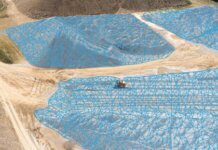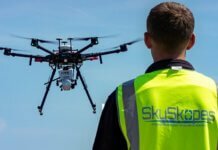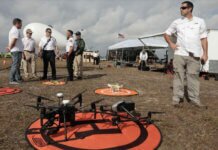A new regional testbed spanning areas of North Carolina will focus on wireless communications for vehicular and unmanned aircraft systems (UAS).
This testbed marks the third award announced by the National Science Foundation (NSF) for its Platforms for Advanced Wireless Research (PAWR) program. In collaboration with an industry consortium of 30 networking companies and associations, NSF is supporting the development and deployment of a new PAWR platform based in Raleigh and Cary, N.C. – named Aerial Experimentation and Research Platform for Advanced Wireless (AERPAW) – that will power research on wireless communications for UAS and ground mobility at a regional scale.
“The platform announced today will enable significant research into the wireless communications capabilities necessary for mobility systems, such as those involving ground vehicles and autonomous drones,” says Erwin Gianchandani, NSF’s acting assistant director for computer and information science and engineering. “By enabling experiments that consider three-dimensional, highly mobile and diverse scenarios, AERPAW will be critically important for enhancing wireless networking capabilities in our communities and for furthering the development of innovative new applications that will improve civic services and citizen safety.”
AERPAW will be an aerial wireless experimentation platform with goals of accelerating the integration of UAS into national airspace and enabling new, advanced wireless features for UAS platforms, such as flying base stations for rapidly deployable wireless connectivity. As part of this effort, AERPAW will develop a software-defined, reproducible and open-access advanced wireless platform with production-like networking and experimentation features spanning 5G technologies and beyond.
The AERPAW platform in Raleigh and Cary joins existing PAWR testbeds POWDER-RENEW in Salt Lake City and COSMOS in New York City. All three platforms are targeting early-stage research in next-generation wireless devices, techniques, protocols and services. The platforms are designed to accelerate the development and commercialization of promising technologies, ensuring continued U.S. leadership in wireless communications, while also preparing the emerging workforce for new job opportunities in the digital economy, says NSF.
AERPAW is led by North Carolina State University, in partnership with the Wireless Research Center of North Carolina, Mississippi State University and the Renaissance Computing Institute. Additional partners are the Town of Cary, the City of Raleigh, the North Carolina Department of Transportation, Purdue University, the University of South Carolina, and other academic, industry and municipal organizations.
“NC State is committed to groundbreaking research that benefits our communities,” says Randy Woodson, chancellor at North Carolina State University. “We’re excited to work with our public and private partners to advance wireless communications and drone interaction.”
The creation, development, deployment and initial operations of the PAWR research platforms are overseen by the PAWR Project Office (PPO), which is funded by NSF and run by US Ignite Inc. and Northeastern University. The PPO works closely with NSF and the PAWR Industry Consortium to manage this $100 million public-private partnership. NSF has committed $50 million in cash toward the research platforms over seven years and expects to announce the development and deployment of one additional platform next year. The 30-member PAWR Industry Consortium has committed $50 million in cash and in-kind contributions that include equipment, expertise and human resources.










